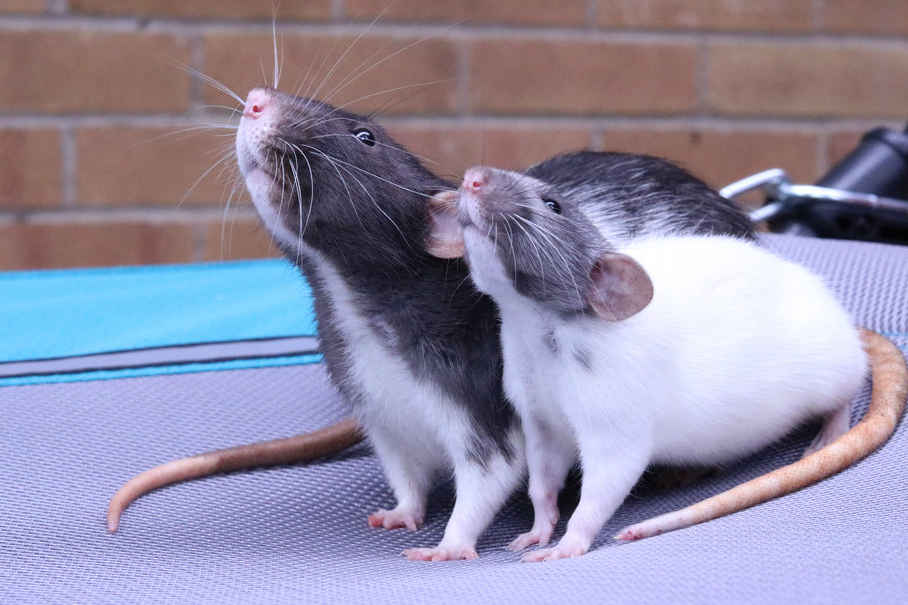A Rat Rattle, Wheeze, Sneeze, Cough? Is your rat sneezing but acting normal, or is your baby rat sneezing a lot? That’s an infection! But wait… Please do not be scared, as we’d show you how to fix it!
Generally, sneezing in pet rats can be a sure sign of respiratory disease and is one of the most common health issues in rats at the vet!
Various pathogens can cause respiratory infections in rats, with the most prevalent cause being a mixed bacterial infection.
Is your new rat sneezing constantly? Here are other signs of respiratory disease to watch out for:
- Sneezing
- Porphyria (red discharge from the eyes and nose)
- Weight loss
- Lethargy
- Increased respiratory rate or effort
Sneezing Rats Home Remedies – How to make them feel better?
Typically, many rats appear to develop respiratory disease after a recent environmental stressor. This can be the introduction of a new pet, changing houses, or occasionally secondary to other conditions. You can calm their sneezes by helping them settle in, and they’d feel much better.
Secondly, rats are also sensitive to new smells (powerful ones) in their environment; some may become harmful after inhaling over time. This includes scented or treated wood, perfumes, smoking, or even buildups of their waste (feces and urine). For this reason, rats should be housed in open-wire cages in rooms with lots of ventilation. Their pens should also be cleaned frequently to prevent ammonia and nitrogen fumes from irritating their lungs.
Thirdly, You can have them in the bathroom while taking hot showers. Finally, steam is excellent for respiratory irritation!
Wash their bedding with unscented detergent a couple of times a week if they have fleece.
Fourth, try a grapefruit extract supplement. Mix it in with yogurt and freeze it into drops for little treats.
Fifth, a drop of liquid Echinacea on a cheerio two times a day for a couple of days, take a break and repeat. Your pet rat should feel better afterward.
Lastly, some rat owners claim dark chocolate helps too. Use a cage that allows you to rinse it in the tub daily without issues (mostly to get off any pee residue on the plastic).
Using a hygrometer, you should observe the humidity in their living area. You don’t want it too dry or too moist.
Lastly, some rats sneeze, even after a trip to the vet.
This rat wheezing home remedy will work for mice too!
How Does The Respiratory Infection Occur?
The primary culprit in rat sneezing infection is a pathogen known as Mycoplasma pulmonis. This commensal bacterium populates the respiratory tract and can be present without causing disease.
It is the overgrowth of Mycoplasma that is associated with pathology. As it rapidly spikes in the population of your pet rat’s trachea and nasal sinuses, the bacterium then upgrades to inflammation, leading to a buildup of respiratory secretions (mucous). This causes the affected rats to sneeze and, in some cases, to breathe faster than usual.

So My Rat Just Has A Cold?
Not really. While Mycoplasma alone is often limited to upper respiratory tract infections, it can cause pneumonia if other viruses or bacteria are present.
Pneumonia is the term used to describe a lung infection (and often inflammation). A wide variety of other viruses and bacteria in rats can work with Mycoplasma to cause this.
The Main Pathogens Are:
Corynebacterium – is a gram-positive bacteria that can trigger lung abscesses.
Streptococcus – another gram-positive bacterium. Humans are carriers and can transmit this to rats, leading to pneumonia, fluid accumulation around the heart and in the lungs, and middle ear infections in rats.
Pasteurella – a gram-negative bacteria that works synergistically with Sendai virus and Mycoplasma to cause pneumonia.
Sialdodacryoadenitis virus (SADV) – is a coronavirus that can cause sneezing and conjunctivitis.
Klebsiella – is a gram-negative bacteria that is evident in healthy rats. It can cause abscesses in several organs.
Sendai Virus – a paramyxovirus that slows down healing within the lungs of already sick rats.
Can I Treat a Sneezing Rat?
Yes, you can treat rats with respiratory disease caused by infections with the help of medications. But, it is unlikely that these medications will cure your rat.
The viruses and bacteria described lead to chronic lung changes that are hard to reverse, and they generally encourage the effects of each other.
Some rats can be treated and not take up to several months to a year to get well, while others can take a few days to a couple weeks.
The chronicity and severity of the infection depend on multiple factors, so supporting your rat’s immune system is a great way to give them the best chance of a long, happy life.
What Treatments Are Available?
Sneezing rats’ treatment involves several medications. The treatment of rat respiratory disease includes antibiotics for the bacteria involved, bronchodilators to reduce the effort required to pull oxygen into the lungs, and anti-inflammatories to reduce inflammation.
Many of these medications will be needed on and off throughout the rat’s life, and over time, the recommended drugs change to better suit the infection as it becomes more chronic.
The article discusses the theory of why rats sneeze and what purpose it serves.
What is Rats Sneeze?
Rats sneeze to release airborne allergens from their noses. The muscles that control the nostrils contract, pushing the allergens out and causing a quick release of air.
Why do Rats Sneeze?
The sneeze reflex is a reflex that allows rats to expel mucus from the nose. Rats sneeze when the trigeminal nerve sends a signal to the brain. The trigeminal nerve controls the facial, eye, and ear muscles.
How do Rats Sneeze?
Rats sneeze to expel mucous and other particles from their noses. However, the act is reflexive, and the rat does not consciously choose to sneeze.
When Do Rats Sneeze?
Rats sneeze to clear their nose of mucous and other secretions. The rat respiratory system is straightforward, so the sneeze reflex is extreme. Sneezing also sends a blast of air out through the nose to clear it of debris.
Why do Rats Wheeze?
There are many theories on why rats sneeze, but the most likely explanation is that they are trying to clear their nasal passages. Rats are particularly prone to respiratory problems, so it is not surprising that they would sneeze in an attempt to clear their nasal passage.
Respiratory Disease in Rats
One common respiratory disease in rats is pneumonia. When exposed to a virus, bacteria, or another respiratory agent, rats can get pneumonia. The most common cause of pneumonia in rats is Streptococcus pyogenes, a Gram-positive bacterium that can cause severe and life-threatening infections in rats and other animals. Other causes of pneumonia in rats include Mycoplasma pulmonis and Chlamydophila psittaci. Pneumonia can be fatal if it isn’t treated quickly.
Why do Rats Cough?
Rats cough for a variety of reasons. One reason is that they are clearing their throat to rid themselves of the bacteria and dust collected in their respiratory system. Rats also cough to clear out fluid from their lungs. Finally, rats may cough to communicate information to other rats.
Do rats sneeze when stressed?
According to a study published in the journal Behavioral Processes, tension and anxiety can trigger rats to sneeze. The researchers found that when rats were put in stressful situations, such as being placed in a small space or taking their food away, they sneeze more frequently. The study’s authors say that this behavior may be an attempt by the rats to relieve their stress.
Sneezing rats home remedies
There are a few reasons why rats sneeze. They may be allergic to something in the air, they may be trying to cool themselves down, or they may be irritated from something that they’ve been exposed to. Whatever the reason, there are some home remedies that you can try to help your rat feel better.
First, ensure that your rat has plenty of fresh air. If sneezing a lot, try opening their cage doors and letting them run around for a while. This will help to clear their nose and lungs of whatever is causing the problem.
Another good idea is to give your rat a cold bath. Fill a large tub with warm water and add enough salt to make it slightly salty. Get your rat into the tub and let them soak for a few minutes. This will help to relieve their symptoms and cool them down at the same time.
Finally, ensure that your rat is getting enough vitamin C. Many rats are allergic to things in the air, so giving them vitamin C supplements can help alleviate their symptoms. Give them 1-2 tablets per day orally or mix them into their food.
Do rats sneeze when cold rats sneezing, but no porphyrin
Rats sneeze when cold because they release porphyrin, a chemical that helps prevent the spread of infection.
Rats sneeze when cold because they are releasing a porphyrin compound. However, rats do not sneeze when they are sick because they release different compounds.
How long can a rat live with a respiratory infection untreated
According to the ASPCA, rats can survive with a respiratory disease untreated for as long as two weeks. However, the rats may experience difficulty breathing and become weakened. If left untreated, the rats may die from the infection.
Where Can I Find More Information?
We know there are books on rat wheezing home remedies and sneezing home remedies, but when it comes to an unwell rat, we recommend an experienced rodent veterinarian sees them.
We at Basic Rat Vets are always happy to see new rat patients and receive daily questions on exotic animals.
Is there any information we missed in this sneezing rats home remedies guide? Let us know by using the comment section below!




